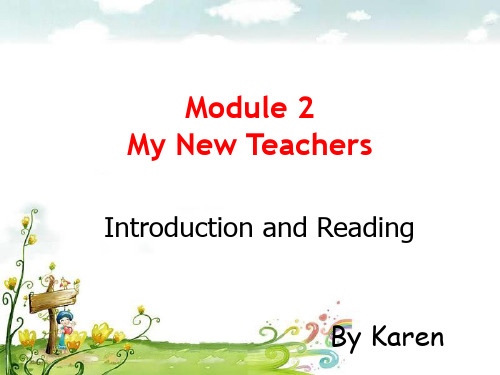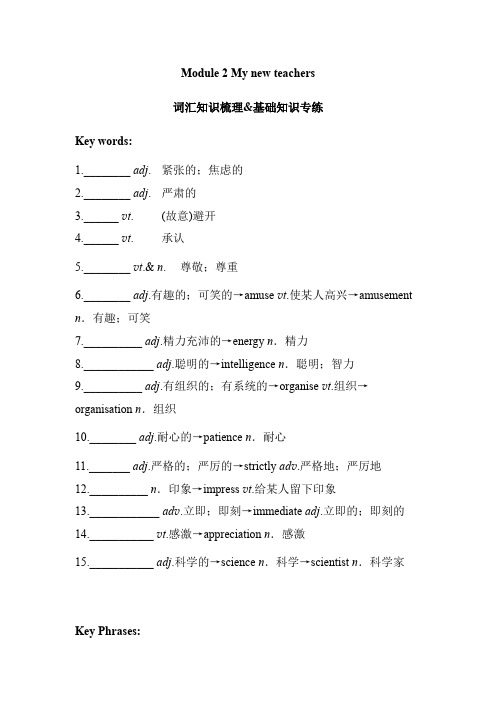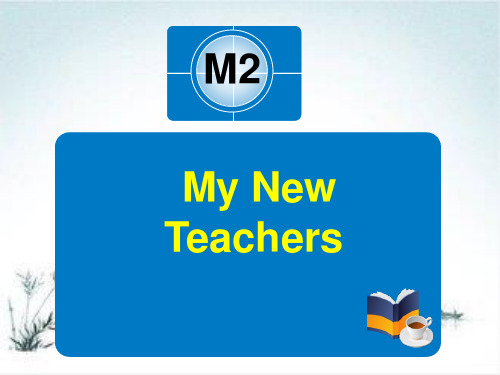外研版高中英语必修一module2
- 格式:doc
- 大小:31.50 KB
- 文档页数:3



《外研版高一英语必修一Module 2 My New Teachers》教学设计课时教学目标鉴于上述分析,形成以下课时教学目标:1.知识目标:学习掌握新词汇和短语,归纳和整理描述人的词汇、短语。
2.阅读技能目标:通过浅层、深层阅读,学会略读、查读文章的阅读能力。
3.情感目标:通过文章学习,使师生关系更加融洽。
教学过程教师活动引导以小组形式进行学生讨论,后以适度点拨,予以评价。
引导学生把文章的内容转换为自己的语言进行叙述,倡导小组合作,教师及时进行鼓励和引领。
通过头脑风暴让学生列举描述人的形容词,激发学生的兴趣。
引导学生结合《导学案》自主预习课文,把握文章大意,完成词汇的识读和结合课文的浅层阅读任务,教师巡视指导、点拨。
给出文章概要,要求学生通过细读、查读等阅读要求找出相关内容,引导学生把握文章结构和主要信息。
能力拓展提升,思维碰撞,集体讨论,完成用英语为文章补充一个结尾。
激情投入,充分预热。
课前预习,学习内容了然于胸。
结合《导学案》自主学习,理解并掌握课文主旨大意,完成预习案和导学案的相关内容,班内展示学习成果。
小组合作完成文章内容的简要总结(以填空的形式)。
小组成员合作学习,共同完成四个精细阅读教学任务。
对文章结构和主要信息能够有意识地进行分析和归纳。
学生活动Teaching process:Step 1: leading- in( 4 min')Let the students list some words to describe people. Use the words mentioned above to talk about your favorite teachers.( 通过引导学生列举描述人的形容词并用这些词来描述自己自喜欢的老师导入课文) Step 2: Skimming ( 5 min')Let the students find the key word of each paragraph through going through the first sentence of each paragraph.Task 1: Read the passage quickly with the following questions in your mind and at the same time check whether your first impressions on the three teachers are in agreement with the descriptions in the passage.1.Who are the teachers mentioned in the passage and what subjects are they teaching now?2.Which teacher are students most afraidof ? Who is the kindest teacher and who is the most popular teacher?( 通过让学生快速阅读,寻找段落关键词、理清文章篇章结构,弄清文章段落大意,培养学生跳读和概括归纳能力)Step 3: Scanning (18 min')Read the passage in detail and answer the following questions paragraph by paragraph.Read para1 answer the following questions. subject impression teaching________ First impression- Shewas_____________she is kindand ________ She _______English grammar so clearly. She ______making you feel stupid.Generally speaking, the class really likes________with her. Personally speaking, I feel I'm going to make __________with her. Read para2 answer the following questions.1. The author's first impression of Mrs. Chen was ______.A. enthusiasticB. kind and friendlyC. strict and serious2. What's the meaning of the phrase “as a result“?A. becauseB. soC. because ofD. result from 3. Fill in the blanks, using the correct form of the word. (1) A few students even admit _______ (like) her.(2) I'll do well in the exam with Mrs. Chen _______(teach)me.4. Which sentence can replace(代替)the one below?We are afraid of speaking if Mrs. Chen doesn't allow it.Read para3 carefully and answer the true or false questions: 1. Mr. Wu is ordinary-looking and boring.2. He's so energetic that every student doesn't fall asleep in his class.3. He talks loudly and fast, and waves his hands about a lot when students are getting bored.4. Personally speaking, I respect him a lot.(通过问题的设计,帮助学生归纳整合段落内部信息,达到训练学生寻读、查读的能力;通过判断正误问题的设计,帮助学生获取有效的信息。

Module 2 My new teachers词汇知识梳理&基础知识专练Key words:1.________ adj.紧张的;焦虑的2.________ adj.严肃的3.______ v t.(故意)避开4.______ v t.承认5.________ v t.& n.尊敬;尊重6.________ adj.有趣的;可笑的→amuse v t.使某人高兴→amusement n.有趣;可笑7.__________ adj.精力充沛的→energy n.精力8.____________ adj.聪明的→intelligence n.聪明;智力9.__________ adj.有组织的;有系统的→organise v t.组织→organisation n.组织10.________ adj.耐心的→patience n.耐心11._______ adj.严格的;严厉的→strictly ad v.严格地;严厉地12.__________ n.印象→impress v t.给某人留下印象13.____________ ad v.立即;即刻→immediate adj.立即的;即刻的14.___________ v t.感激→appreciation n.感激15.___________ adj.科学的→science n.科学→scientist n.科学家Key Phrases:1.__________确定;确信;查明;弄清楚2.___________同意;赞同;适合3.______________犯错误4.________因此;为的是5.______________取得进步6.____________结果是7.___________在……方面做得好8.________事实上9.____________睡着10.___________讲笑话;开玩笑重点讲解:Words&Key Phrases:1.patient adj.耐心的n.病人(教材P12)She's kind and patient.她既善良又有耐心。


外研版⾼⼀英语必修⼀Module2检测试题及答案(2) 第⼆部分阅读理解(共两节,满分50分) 第⼀节 (共20⼩题;每⼩题2分,共40分) A At noon I stopped at the traffic light and saw a homeless man walking up and down in the street. It was a hot day. “This will make him smile,” I thought. I turned my car towards a frozen yogurt (酸奶酪) shop. I took a cup and filled it and came to the counter to weigh it. I wanted to add some toppings, something delicious put on the top, but my change was not enough for that, so I asked the lady if she would take a $100 bill. She said she wasn’t allowed to accept a bill that large. So I just paid for the yogurt. As I was about to leave, she said, “Madam, don’t disappoint your child. Please add their favorite toppings.” I turned to her and said, “Thanks, but this is not for my child. It’s for the homeless man in the street.” She smiled with surprise and said, “Oh! That’s really sweet of you. God bless you.” She thought for a moment, and then she said, “I think we can do better than that.” She took a bigger cup, filled it nicely and covered it with colorful toppings. Then she handed it to me and said, “This is from me. Please give it to the homeless man. Let’s treat him nicely.” Now it was my turn to be surprised. I said, “Thanks a lot.” Then I left with a big smile on my face. On the way I said to myself, “Angels are real, aren’t they? I believe them because I saw one today!” 31. The author turned her car towards the shop in order to . A. buy herself a cup of frozen yogurt B. cool herself in the frozen yogurt shop C. ask someone there to change a $100 bill D. make the homeless man in the street happy 32 The lady in the shop at first thought that the author . A. bought something for her child B. was going to do a good deed C. didn’t need to add any toppings D. would be disappointed without toppings in her yogurt 33. We can learn from the passage that . A. the author got a lot of colorful toppings for free B. the author realized that the lady was very kind in the beginning C. the homeless man would probably receive two cups of yogurt D. the lady was so moved that she didn’t take the author’s money B “The British and Americans are two peoples separated by a common language.” — Oscar Wilde Though American English has become much different from British English, more and more British words and phrases are becoming common in American English. Here are some examples. Bloody If there is anything Americans like, it’s a good word to express their great anger. For example, “It’s bloody cold out there! What a bloody and costly failure!” Bloody is now well accepted by most Americans. It’s a way of swearing (咒骂) in America. Chat up The British expression “chat up” for flirting (搭讪) is much gentler than the American expression “hit on”. That may be why more Americans are using “chat up” especially when talking about their own actions. Ginger Before the first Harry Potter book came out, Americans only used the word ginger when referring to the spice (调味品). Ginger has almost always been a color as well as a spice for the British. Now more and more Americans are talking about “ginger cats” and “ginger hair”. Sell-by date More and more American members of the media are using this British term in place of the American term “expiration date” on which something, such as a license, is no longer in effect. American products are also using this term, which is a bit more descriptive than “expiration date”. Spot on In the 1970s, the American expression “right on” was popular, which had the same meaning as “exactly right”, but it has become out of date. Now, the British expression “spot on” has taken the place of “right on”. 34. The British will complain about the cold weather by saying “ ”.A. it’s bloody cold todayB. the weather chats upC. the weather has too much bloodD. what a bloody day 35. According to the passage, “a ginger cat” refers to a cat that .A. enjoys eating gingerB. has yellow furC. smells like gingerD. likes the color yellow 36. What does the “sell-by date” of the products mean? A. The price of the products. B. The rights that the producers should have. C. The date when the products are produced. D. The date after which the products should not be sold. 37. Which of the following can be the best title for the passage? A. English—a common language B. How does American English develop? C. British English is entering American English D. Differences between American English and British English C Who are your favorite teachers? My classmates and I were asked this question on the first day at the university many years ago. It was a great way to begin my career in teaching—thinking about people in the profession who had the most positive (积极的) influence on me. We were asked to write down our answers. I thought of Sister Mary Margaret and Sister Mary Anne, who taught me in the kindergarten. I thought of Mrs. Padgett and Mrs. Kofford, English teachers, and Mr. Kutras, a history teacher, in high school. Then I thought of Dr. Lincoln and Dr. Campbell, history professors, and Dr. Kirk, an English professor, who taught me in college. Then came this question, “What do they all have in common?” My hand went up first and I said, “They all loved what they were doing. They had great enthusiasm (积极性) for teaching.” All of my fellow graduate students nodded their heads. That was the right answer Dr. McSweeney expected. He said, “I ask these questions every year, and I always get the same answers.” He went on to explain that he opened with these questions because they were proved to make things have a good start, and they would make future teachers think about what separates the great teachers from the not-so-great. He said, “We all remember our favorite teachers—the ones who had passion (激情) and enthusiasm, the ones who loved and enjoyed what they were doing. I want each of you to become that kind of teacher. Always remember those special teachers.” It was a statement I never forgot during my thirty-five years in the classroom. 38. According to the passage, an excellent teacher should have .A. much experience in teachingB. a wide range of knowledge C. passion and enthusiasm for teaching D. abilities to ask questions 39. The author thinks that teachers who are liked best by students .A. live a positive lifeB. are mostly women teachersC. teach very wellD. have positive influence on students 40. By starting with those questions Dr. McSweeney wished his students to .A. become great teachersB. enjoy his lesson C. remember him forever D. tell great teachers from common ones 41. What can we learn about the author from the passage?A. He works in a university.B. He is actually a teacher. C. He likes Dr. McSweeney best. D. He was always the best student in school. D Sitting in her yard in Hartford, Connecticut, nine-year-old Alice Cogswell watched the children playing games. From their faces she could tell that they were laughing. But she couldn’t hear their voices. Alice had been deaf, living in a quiet world since a serious illness took away her hearing when she was 2. The year was 1814, and few opportunities were given to children like Alice. Unable to hear or talk, she didn’t attend school. There were no teachers to teach deaf children across America. In those days, most people believed that deaf children couldn’t learn at all. One day, her neighbor, Thomas Gallaudet, noticed that Alice wasn’t playing with other kids. When he tried to speak to her, he realized that she couldn’t hear. But he couldn’t miss her bright and curious eyes. Placing his hat on the ground, he spelt the letters h-a-t. Alice understood, and soon Gallaudet became her teacher. Gallaudet had learnt about schools for the deaf in Europe. He thought, “Why shouldn’t Alice and other deaf children in the United States have such a school?” Encouraged by Alice’s progress, Gallaudet decided to go to Europe to learn their ways. After 15 months there, Gallaudet returned to Connecticut, together with Laurent Clerc, a teacher from a famous school for the deaf in Paris, France. Gallaudet and Clerc opened the country’s first deaf school in 1817. There were 33 teachers and students at the very beginning, including Alice. They created the American Sign Language, which was based partly on the French sign language and partly on signs the students invented. Deaf students could now learn subjects like reading, history and math, as well as skills like shoemaking and cabinetmaking (家具制造) for boys and housekeeping for girls. 42. Which of the following about deaf children in the US before 1814 is TRUE? A. They were treated as normal kids in schools. B. They communicated with others with the help of a sign language. C. It was almost impossible for them to receive an education. D. They weren’t allowed to play games with normal kids. 43. Gallaudet taught Alice to learn the first word by . A. using a sign language B. combining a thing with a word C. playing games together with her D. telling her how to write the letters on her own 44. What can be learned from the passage? A. Alice made some progress in her studies. B. Alice was deaf when she was born. C. Laurent Clerc created the American Sign Language. D. Only boys were allowed to learn the skill in making shoes in America. 45. The passage is mainly about . A. American people’s concern about deaf kids B. the life of an American girl Alice Cogswell C. the development of the American Sign Language D. the founding of the first school for deaf children in America E Are you angry? Are you unhappy in your job? Wish you had a means of expressing those feelings? Well, if you lived in Buenos Aires, Argentina, you could go to Break Club. It’s made up of people who get together to break things as a way to release (释放) their feelings. They can throw bottles at the wall, or break an old computer into pieces. Mora, a club member, is a 22-year-old media (媒体) producer who works hard and is always stressed out. She says, “I have to deal with so many people and things every day, which drives me mad. I have a paper heart and my nerves are at the breaking point. Well, now it’s time to break something.” She wears overalls (⼯装裤), thick gloves and glasses. In her hands there’s a baseball bat ready for action. After destroying an old computer monitor, Mora is almost out of breath but has a smile on her face. “I feel like a new person. I’m happy! I’m ready for anything!” she says. The club’s creator, Guido Dodero, says most of the members are young women. Dodero explains,“This is still quite a manly country. Women feel angry and they also want to play an important role in society. They need to break from that every now and then and the club is the place for that.” Some members bring a picture of the former (以前的) husband to destroy. Others bring a picture of… well, it could be of you or me. Dodero says Break Club is the only one of its kind in Argentina, but there are many similar clubs in Spain, Japan and the US. With the development of society, Break Club may become a necessary part of daily life. There might be one near you soon. Do you feel like breaking things? 46. People in Buenos Aires go to Break Club to .A. have a drinkB. destroy the clubC. meet some new friendsD. release their anger or unhappiness 47. What has actually caused Mora to go to Break Club?A. Her stressful job.B. Her broken heart.C. Her terrible nerves.D. The wild thought in her mind. 48. How does Mora feel after she has destroyed an old computer monitor?A. She feels very sorry.B. She feels better than before.C. She feels puzzled but happy.D. She feels alone but comfortable. 49. Who are the club’s main visitors according to the club’s creator? A. Men who control the country. B. Young and very angry women. C. Women who are important to society. D. Women whose marriages fail. 50. Which of the following is TRUE according to the passage? A. People can destroy anything in Break Club. B. Break Club is very common in Argentina. C. People often hurt themselves while breaking things. D. Break Club may become popular all over the world. 第⼆节根据对话内容,从对话后的选项中选出能填⼊空⽩处的最佳选项。
Module 2 My new teac-Reading and VocabularyLearning aims:1. learn the new words in Reading and Vocabulary2. grasp the main idea of the passage in Cultural Corner.Learning steps:【个人探究】Read the words in the box and have the students repeat them after me, paying particular attention to stress.ⅱ.Ask the students to work in pairs to find the meaning of the words in the box first and then do questions and answers.ⅲ. Check the answers in class. (Students’ own answers)【合作探究】Deal with Activity 2Ask the students to decide which words might go into the spaces. If necessary, explain the words or expressions.Check the answers in class by listening to the conversation and ask a few students to write their answers on the blackboard.【当堂训练】Finish Activity 3.ⅰ. Play the tape again, and ask the students to choose the right answers individually, and then check with their partners in groups of four.ⅱ. Then ask some groups to give their answers in class.【全员探究】Discussion.All of you have been to several different schools, and have known different teachers and students, now tell me:1. What do you think of the relationship between teachers and students?2. How do you find our school?【训练达标】1. Read the passage again and fill in the chart in pairs.2. Match words and expressions with their definitions .relationship be suitable forformal like, the state of being likediscipline order, rulesrelaxed connection, having sth. to do withsimilarly in accordance with rulesbe true of less tight or strict3. Read the passage again and try to retell it.【Homework】1.Write a passage about the relationship between teachers and students in China.2. Read the passage fluently.。
Module 2 My new teachers1patient 耐心的be patient with sb/sth 对某人或某事有耐心patience 耐心impatience 名词,没有耐心impatient 形容词,没有耐心的with patience 有耐心Out of patience无耐心①He is one of Dr.Wu's patients.他是吴医生的病人之一②She is very patient with young children.她对小孩子特别有耐心。
③She is patient with the patient.她对病人很有耐心。
avoid避免avoid sth 避免某事avoid doing sth避免做某事①She avoids making you feel stupid 她尽量不让你觉得傻②You should avoid such mistakes next time下次你应该避免这样的错误appreciate欣赏感激Appreciate doing=Appreciate one’s doing 感激某事I would appreciate it if....如果....我将不胜感激①We appreciate your/you helping us.我们感谢你们的帮助。
②I would appreciate it if you would turn the music down.如果你把音乐关小一点,我将不胜感激admit 承认admit sth 承认某事admit doing sth承认做某事admit that+句子...承认...admit sb to 允许进入be admitted to 被允许进入①You have to admit what the teacher said was right.你不得不承认老师说的是对的。
②She admitted having broken the trafic rules.她承认违反了交通规则。
Module 2 Book IMy New Teacher一、课程分析(一)学习内容本节课所授内容是本模块的阅读部分。
重点谈了“我”升入高中后,对三位新教师的个性以及教师执教风格的描述。
旨在让学生运用本模块所学词汇及表达“偏爱”的短语来描述自己的课堂感受,描述喜爱的老师,最终让学生提高表述“学校生活”的综合能力。
(二)学习重点学生在能准确地识读单词,记住释义及主要用法的基础上,能运用本模块所学词汇及短语表达偏爱;会用恰当的词汇描述自己的课堂感受和自己喜爱的老师;能听懂对教师特征及其风格的描述并荻取信息。
(三)学习难点学生掌握描述教师特征及其风格的词汇或表达方式。
二、学情分析高一学生具备一定的听说能力,但掌握的词汇量较少,阅读能力还有待提高,但学生的表现热情较高。
本篇文章“My New Teachers”对高一新生来说,是非常熟悉的话题。
三、设计理念引导学生总结、运用新学词汇及短语,并以课外作业的形式,让学生通过其它资源获取更多介绍师生关系等方面的信息。
课堂上,通过老师设计的问题和活动,让学生的阅读和表达技能得到加强,充分体现“和谐高效,思维对话”的教学理念,教学流程由Pre-class, Leadi ng-in,Skimming, Scanning, Discussion and Acting,Homework组成。
四、学习目标本节课侧重于训练学生的阅读技能,在保证学生理解课文的前提下,引导学生从自己的角度描述不同教师的执教风格,同学之间谈论对教师不同教学风格的偏爱,围绕“我最喜爱的教师”和“师生关系”等话题内容,展开讨论,让学生学会更好地理解别人,实现感情交融。
五、教学流程(一)课前准备Step 1:Pre-class1. Ask thestudents toprepare their graduation pictures.2. Ask thestudents to collectasmany words about theirgraduatio npicturesaspossible.【点评】以自己所准备的材料来预知新课内容,调动他们的好奇心和求知欲;收集有关词汇,也为新课的顺利进行做好充分的准备。
2011-6-22
一、单词
1.patients
2.avoid
3.appreciate
4.admit
5.dare
6.unless=if…not
7.relaxed
8.consider
9.hate
10.rather
二、词组
1.make sure
be sure of/be sure that
be sure to do
2.so…that…
so that
3.either…or…
4.prefer to do sth.
5.pay for
6.have problem with…
7.be true of
8.It’s up to you.
三、辨析
1.so…that… & such…that…
2.like & enjoy & love & be fond of & care of
3.among & between
4.hate & dislike
5.现在完成时 & 现在完成进行时
6.某些动词后接—ing形式作宾语与后接不定式作宾语的含义不同
四、语法
1.with+宾语+宾补的六种句式
2.it作形式主语或形式宾语
3.现在完成进行时
一、单选
1.Will you join us in the game?
Thank you,__________.
A. but why not? B. but I’d rather not. C. and I won’t. D. and I’ll join.
2.Do you want tea or coffee?
_____.I really don’t mind.
A.Both B.None C.Either D.Neither
3.He didn’t plan his time well,_____he didn’t finish his work in time.
A.even if B.until C.so that D.as a result
4.It was___that we wanted to stay here for another two days.
A.such fine weather B.such a fine weather C.so fine weather D.so fine a weather
5.Ther weather was___cold that I didn’t like to leave my room.
A.really B.such C.too D.so
6.I called him before going to see him in order to___that he was at home.
A.be sure B.find C.make sure D.making sure
7.He likes___football,but he doesn’t like____football this afternoon.
A.playing to play B.to play playing C.to play to play D.playing playing
8.I consider him__my best friend.
A.for B.as C.to D.with
9.They spent a___evening in the country and felt very___.
A.relaxing relaxing B.relaxed relaxed C.relaxing relaxed D.relaxed relaxing
10.Will you go to Tom’s birthday party?
No,I won’t____invited.
A.if B.unless C.since D.when
11.Nobody knows why she____tell the truth while all the others were waiting.
A.wasn’t dare B.didn’t dare C.dared not to D.dare not to
12.The boy had to admit___the window.
A.to have broken B.breaking C.to break D.him to break
13.I’d appreciate___if you would like to teach me to use the computer.
A.that B.it C.this D.you
14._______the student insists that he should be separated from his deskmate,who is naughty.
A.To avoid being affected B.To avoid to be affected
C.Avoiding being affected D.Avoiding to be affected
15、I’ll look into the matter as soon as possible.Just have a little____.
A.wait B.time C.patience D.rest
二、填空
1. The teacher should be patient_______the students.老师应该对学生有耐心。
2. I try to avoid________on Saurdays because the stores are so crowded.我尽量不在周六去购
物,因为那时商店太拥挤了。
3. Mary admitted her________.玛丽承认了她的错误。
4. She admitted (to)_____ ______the letter.她承认读了这封信。
5. He admitted to the teacher that ________ _______ _______.他向老师承认他错了。
6. _______________________________你敢回答这个问题吗?
______________________________你敢回答这个问题吗?
7. Please sit down and______yourself.请坐下放松一下自己。
8. Enjoying music is his favorite__________.享受音乐是他最喜欢的放松方式。
9. We are considering________an new car.我们正在考虑买一辆新的轿车。
10. You’d better_____ ______ ______the time and place.你最好把时间和地点弄清楚。
11. Make sure______ _______the door before you go out.在你出去之前一定要锁门。
12. The workers did_______ _______that the boss was pleased with them.工人们干的很好,老
板对他们很满意。
13. The children would walk there______ _______take a bus.孩子们宁愿步行去那里而不愿乘
坐公交车。
14. John wants to see me today.I would rather he_______tomorrow than today.约翰今天来看我,
我宁愿他明天来。
15. Mary is very sad.I’d rather you_______ _______her the news.玛丽非常伤心,我宁愿你没告
诉她这个消息。